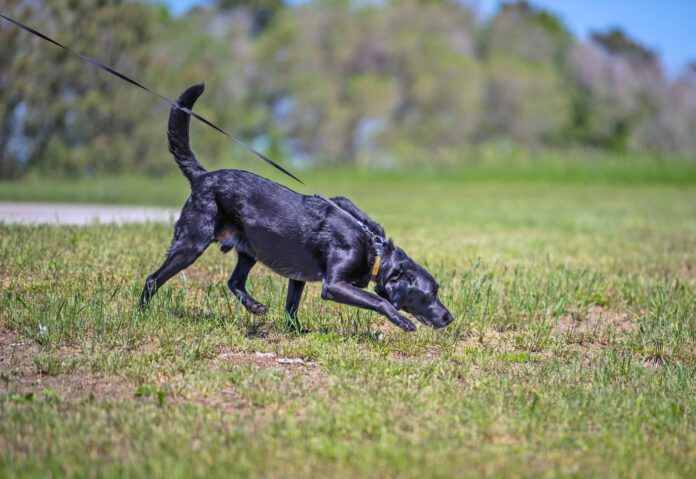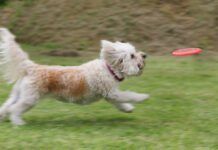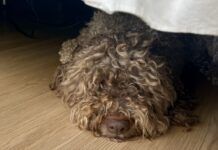Dog Sports. These two words conjure up a vision of fun for you and your dog. But what if your dog is reactive to either other dogs or humans or both? Are some dog sports better than others for dogs with reactive behaviors? The answer is yes. We will explain which sports are better choices for reactive dogs and which ones are probably best left alone.
Before we start, is your dog reactive? Reactive dogs are dogs that become overly aroused by what would be considered by most dogs to be normal things. A reactive dog isn’t necessarily aggressive, although some are. It’s just a dog who gets too excited by everyday things in the dog’s environment. A dog with reactive behavior may bark loudly without stopping, possibly lunging at the stimulus, or maybe snap or growl in excitement.
For dogs who exhibit reactive behavior, some dog sports can help reduce your dog’s stress and put their high-intensity focus to work, but you should give great consideration to your choice of a dog sport and, we recommend, work with a trainer.
Dog Sports for Dog-Reactive Dogs
Scentwork/nosework. This is the most cortisol-reducing dog sport out there, meaning it helps reduce your dog’s stress. The simple act of sniffing brings down the heart rate and the cortisol level.
I was advised that the National Association of Canine Scent Work or NACSW is the most welcoming of nosework venues. This is a specific competition venue/organization that is separate from other scentwork trials. It’s understood in NACSW that if your dog is reactive, they wear a red bandana to alert others that they need space. There are often separate parking and potty areas for such as well, proving an additional layer of emotional safety for both the dog and their human.
All dogs work from their vehicles. Dogs must always be in cars unless they are taking their turn or for a potty trip. There are no exceptions, and it’s well enforced at all trials. NACSW has trademarked the term nosework, so all other competitions are called scentwork. Other venues can be hit or miss for accommodations made for reactive dogs. The dogs do their search without other dogs present in all venues, but navigating the venue areas itself may not be as easy in other venues not run by this organization.
Tracking (as in trailing a scent along a path) is a great option for reactive dogs since this is done one at a time and the dog stays on a leash. It’s also deeply relaxing for the dog in question, because it involves sniffing/scent, which lowers cortisol levels and decreases the reactivity baseline.
Dock diving can be done with a reactive dog. Competing is done with one dog on the dock at a time. Waiting on one’s turn, spacing can depend on the venue, but there is typically an option to keep sufficient distance between your dog and other dogs, for all but the most reactive dogs. Do keep in mind though that this is a high adrenaline activity so some coping skills for reactivity should already be in place for your dog to reach for before and after his/her turn.
Trick training can be done with just you and your dog. I don’t know any dogs who dislike learning tricks and getting rewards, and your dog can earn titles. Win/win for the dog and the human!
Weight pulling is another sport where reactive dogs can excel. There are accommodations that can be made in competitions for all but the most reactive dogs. This type of sport can help dogs to focus on something other than other dogs. Your dog must be in top physical shape for this sport, however.
Dog Dancing aka Canine Freestyle can be a good choice with some quality work on reactivity. Although this sport is done off leash and requires basic obedience training, it is a carefully taught dance that focuses on the relationship between the human and the dog. There is much more mutual focus between the two species with this activity than with many other dog sports. Building a superb relationship such as required for successful canine freestyle in of itself mitigates quite a bit of reactivity.
Sports to Avoid With a Reactive Dog
Some sports are high-adrenaline, exciting sports that can even put normally quiet dogs in a state of overexcitement. Some reactive dogs do participate and excel in these sports, but they require a savvy handler, a great deal of training, and the ability of the dog to focus on the event itself. For most reactive dogs, it’s best to avoid these sports.
Canicross. Already high adrenaline, this sport is basically cross-country running with your dog, except that the dog is pulling the human along. As you might imagine, much can go sideways with this option. It is performed on leash but on a long line.
fastCAT. Another high adrenaline sport with dogs running in close proximity to one another at a natural state of high arousal, for even laid-back dogs. The dog is off leash and with this kind of adrenaline rush, this is too chancy, in my opinion, for a reactive dog.
Agility. My reasoning for avoiding agility with a reactive dog is similar to fastCAT, although agility is slightly more controlled. With agility, the dog is off leash in the agility ring and the sport is a speed sport. If your dog is only mildly dog reactive and you can modify that tendency sufficiently while focusing your dog on the agility course, then would I say you could consider this sport. I do get quite a few referrals from an agility instructor to work on the reactivity before the dog is permitted back into competition.
Flyball. Another sport that uses high adrenaline. Dogs race in teams, passing one another off leash on the course. There is no higher high for dogs obsessed with balls than this sport, and flyball is also focused on speed.
Human-Reactive Dog Considerations
Obviously, dog sports have other humans directly involved, including others competing their own dog, managing the venues, judging, assisting, set up, break down, and everything that is necessary for the sport to function appropriately. The degree of reactivity that your own dog exhibits and what their end game is with their concerns are important considerations. While a quieter sport like Rally Obedience might be a good choice for your dog, there are people in the ring with you, including the judge, of course. Rally and obedience will require your dog to be super focused on you, which may be helpful to a reactive dog.
Some sports may be done virtually. Now if your dog is simply reactive to certain humans or certain human actions and you work with a qualified rewards-based professional in advance of competing, and that professional oversees your progress, then any number of these above-named sports are possibilities.
The sports mentioned in this story are some of the more popular dog sport events, but they are only some of the options. Working with a qualified trainer can help you determine what sport may be best for your dog and still fun for you. The American Kennel Club offers a variety of event choices, and there other sports on under the AKC wing, like Barn Hunt, which is a scent sport, that might work for your dog.
When considering a sport, be very mindful of how your dog would function off leash in the ones that are performed off leash. Be truthful with yourself on this subject. Now the caveat on human reactive or simply human fearful dogs is that there is a small category of dogs who adore other dogs so much that their mere presence helps that reactive/fearful dog to function more normally with humans around. This category is the best human reactive category to compete in dog sports where many other dogs are around.
As always, if unsure, please consult with a well-qualified rewards-based dog behavior professional (not simply a trainer in the sport that you wish to compete in) to have your dog evaluated for what you want to expose your dog to. Wanting to spend time together with your dog that includes enrichment is always a good idea. Just make the right choices for both of you.






